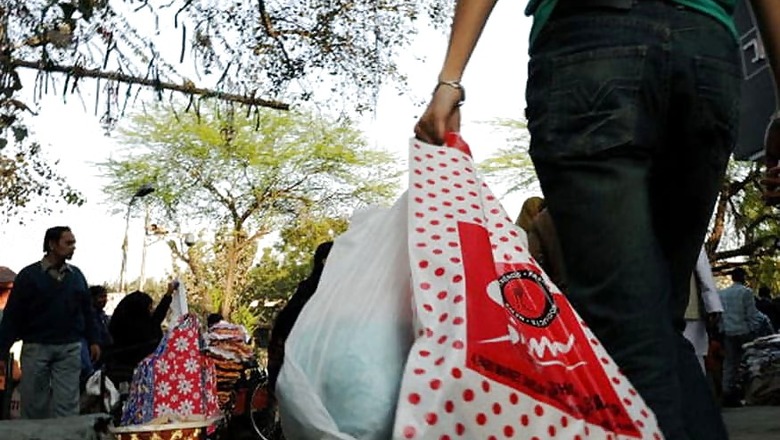
views
India looks all set to formally ban single-used plastic. Prime Minister Narendra Modi in his address to the nation from the ramparts of Red Fort on the 72nd Independence Day made clarion call to free India from single-use plastic. He called upon the citizens to give up single-use plastic by October 2, the birth anniversary of Mahatma Gandhi.
At the 14th session of the Conference of Parties to the United Nations Convention to Combat Desertification (UNCCD-COP14), the Prime Minister urged the global community to "to say goodbye to single-use plastic."
Earlier this week, Prime Minister Narendra Modi, while speaking in Mathura, Uttar Pradesh asked the citizen to make their homes and workplace single-use plastic free by October 2. On World Environment Day 2018, the Government of India had announced its plan to eliminate single-use plastic by 2022.
Amazon recently said that it will stop single-use plastic packaging in India by 2020. The e-commerce company said that it was developing plastic-free alternative for bubble wraps and mailers and will collect plastic at it warehouse networks from this month.
Single use plastic or disposable plastic includes items that are used only once before being discarded or recycled. Such kind of plastic is most often used for plastic carry bags, cutlery as well as for packaging.
Here are a few single-use plastic alternatives
In the United States, a home delivery service called Loop has joined hands with brands to deliver products to consumer doorsteps using reusable packaging. The company delivers items to the subscriber's door and once the consumer has finished using the product, Loop picks up the empty packages, cleans them and reuses them.
In Japan, Nestle has given up use of single use plastic and the company is now making use of paper wrapping package for its KitKat products to combat plastic waste. The packaging also comes with instructions to create origami.
Furthermore, Portuguese airline Hi Fly, which made use of the world's first single-use plastic-free flight in December 2018, aims to replicate the model across its entire fleet. It is attempting to do the same by the end of 2019. Notably, the airline is making use of bamboo and compostable alternatives as well.
Beverage Company Coco-Cola is also stepping up its green initiative by giving a makeover to its Dasani brand, the bestselling bottled water. Dasani water will now be available in aluminum cans. The company will initially launch aluminum cans in the Northeastern Unites States this year and will gradually expand it to the other regions in 2020. Coco-Cola will also install water vending machines across the United States under the brand 'PureFill'.
Another beverage major, PepsiCo will also from 2020 offer its 'Aquafina' water brand in aluminum can packaging in US food service outlets.
In 2019, McDonalds, the burger giant, opened a nearly plastic-free restaurant in Berlin called the 'Better McDonald’s Store' where it replaced plastic straws with paper versions and changed plastic cutlery with wooden cutlery. They even introduced edible waffle cups as well. In Germany, McDonald's started serving hot drinks in porcelain or glass mugs as well.
Back in home, a north-east state in India, Sikkim, has been officially fighting against plastic-use since 1998. In 2016, Sikkim banned plastic bottles in all government departments and programmes. Not just this, Sikkim also banned the use and sale of disposable items such as cups, plates, spoons, containers and many such items made from polystyrene foam.
The Indian Parliament has also banned the use of non-reusable plastic water bottles and other plastic items with the complex. Officials and staffs have been advised to use environment-friendly biodegradable bags and other materials.
Indore becomes another state with the municipal corporation of the city in Madhya Pradesh replacing plastic bottles and single-use utensils in its offices with traditional alternatives like copper, glass among others. To promote the use of reusable utensils, the Indore Municipal Corporation has also planned to install dishwashers at its offences as well as in marketplaces where there are multiple food outlets.
To support the ban on single-use plastic, Indian Railways has decided to impose ban on single-use plastic material on its premises as well as in trains. Railway Board authorities have been asked to install plastic water bottle crushing machines at 360 major stations and Indian Railways Catering and Tourism Development Corporation (IRCTC) has been to return plastic drinking bottles as part of the Extended Producer Responsibility.
Railway vendors will be asked to avoid use of plastic carry bags. Passengers travelling in trains will soon be served tea, snacks and meal in kulhads or earthen cups and earthenware plats at 400 major stations across the country. Khadi and Village Industries Commission (KVIC) will provide 30,000 electric potter wheels as well as grinding machines to recycle/crush the earthenware.
Not just this, several hotel chains have decided to put an end to the use of single-use toiletry bottles.




















Comments
0 comment